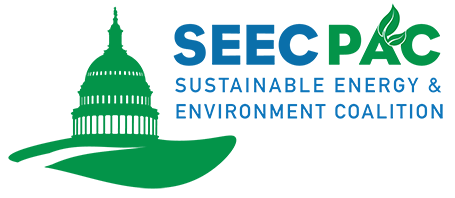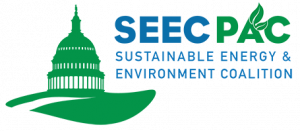CLEAN ENERGY
Combating the existential threat of climate change requires a transition to a clean energy economy.
The Trump Administration marked an era where the federal government openly subverted the development of renewables. For example, during the height of the COVID-19 pandemic the Trump Administration hit solar and wind projects with massive retroactive rent for operating on public lands at the same time they were providing relief to oil and gas companies.
But SEEC Members were able to effectively fight back. When President Trump proposed $0 for the Advanced Research Projects Agency-Energy (ARPA-E) that researches new clean energy technologies, SEEC members advocated for an increase in funding that ultimately lead to a $10 million increase from the previous year’s budget.
We’ve helped lead other important wins too. In 2020’s Clean Economy Jobs and Innovation Act, SEEC members advocated for a phased own of HFCs, an extension for clean energy tax credits, significant investments in energy storage research, grid modernization, and energy efficiency, and much more.
There’s much more to do, and with a partner in the White House, we are optimistic about our clean energy future.
During the Trump Administration, we had to play a lot of defense. SEEC members pushed back when his budget tried to cut the Land and Water Conservation Fund (LWCF) by 97% and we fought to restore legal protections for migratory birds after the Trump Administration overruled nearly 100 years of precedent in 2017 and declared that companies could kill birds as a part of doing business with no requirement to change their behavior or use best practices.
SEEC members also fought back against the Trump Administration’s efforts to auction away public lands as fast as possible — at times even giving them away for pennies during the height of the COVID-19 pandemic.
But we had some real victories too. SEEC members advocated for many of the ideas that were included in 2020’s Great American Outdoors Act, which fully funded the Land and Water Conservation Fund for the first time since the 1960’s and has been called one of the most important environmental laws in decades.
The House just passed a major energy bill
Did you hear? Last week the House of Representatives passed a bipartisan energy package that will help us advance important clean energy solutions. SEEC supported
This bill rejects rejects Trump’s drastic clean energy cuts
Last week we wrote to you about an important environmental funding bill moving out of Committee. Today the House Appropriations Committee will continue its work
Protecting the clean energy sector from economic strain
SEEC members are calling on House Leadership and their colleagues in Congress to take urgent action to stop clean energy job losses and keep renewable

